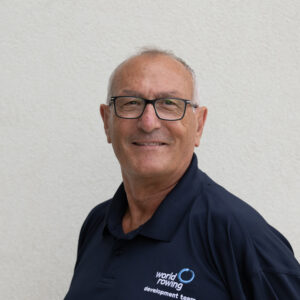
13 Apr 2023
Gianni Postiglione – Expert tips from World Rowing’s Coaching Director
World Rowing caught up with Gianni Postiglione, World Rowing’s Coaching Director and Greece’s National Coach, to learn more about his approach to coaching.
First, let’s explain the role of a World Rowing Coaching Director. Postiglione says, ‘Overall, my role is to promote the development of rowing in emerging countries, often with limited resources and increase the competitive level at the Olympics. I work closely with coaches and athletes to identify talent and develop sustainable systems that lead to long-term success.’ He cites with pride how many nations are building their rowing programme, including the unprecedented recent Olympic successes of Greece, South Africa and Lithuania.
Postiglione is well placed to help, given his rich credentials as a rower and coach. He started his rowing journey at the Real Yacht Club Canottieri Savoia in Naples in 1966 and won his first Italian title a year later. He represented Italy at the Under 19 and Under 23 level, an impressive feat given Postiglione only weighed 78kg and competed before lightweight rowing was mainstream. He retired in 1973, a year before lightweight rowing was introduced at the World Championships.
 He has since coached athletes to the top, including Stefanos Ntouskos, the Olympic Champion in the men’s single in Tokyo. Postiglione beams, ‘my proudest moment was when Stefanos, fresh off the Olympic podium in Tokyo, embraced me and expressed his gratitude.’ Postiglione was also named Coach of the Year by World Rowing in 2011.
He has since coached athletes to the top, including Stefanos Ntouskos, the Olympic Champion in the men’s single in Tokyo. Postiglione beams, ‘my proudest moment was when Stefanos, fresh off the Olympic podium in Tokyo, embraced me and expressed his gratitude.’ Postiglione was also named Coach of the Year by World Rowing in 2011.
On the practicalities of coaching, Postiglione first addresses the importance of variety in the early season. ‘I do not believe in solely focusing on one physiological target during winter training as it may lead to deficiencies in other areas. Training on the boat, ergometer, or low-intensity bike for too many months can also be counterproductive, so I alternate training methods to provide different stimuli for the brain,’ he says.
During the racing season, Postiglione says, ‘the key programme changes in the warmer training blocks involve an increase in high-intensity training sessions and competitions, which heightens the lactate anaerobic area’.
He spotlights the importance of bespoke support for athletes. Postiglione says, ‘through regular testing, support staff can determine the optimal approach for each individual, as every rower has unique needs and responds differently to training. As a result, we often manage multiple plans simultaneously. This demands exceptional organisational skills. Flexibility is the key to a holistic approach to training’.
Another key task for a coach is managing the peaks for athletes, timing them to ensure top performance at big competitions, such as the World Championships or Olympics. There are also intermediate peaks to navigate, like time trials, regional competitions and the World Cup, ‘The World Cup is particularly important as it helps to verify the selection and physiological maturity at that point and can be an opportunity to make adjustments to crews,’ remarked Postiglione. His approach includes having six training cycles in his annual planning and running a ‘control test’ at the beginning of each cycle to track progress and make changes.
Given the pace of innovation in rowing, Postiglione is a strong advocate of new techniques and technology. He notes how devices helps provide immediate feedback to connect boat feel to performance. ‘The PM5 monitor and GPS2 training pack are two examples of technology that have been effective in rowing training,’ he says. Postiglione also expects further progress on the real-time evaluation of stroke efficiency to provide precise feedback and enable an optimisation of training.
Regarding advice for new rowers, Postiglione deploys a metaphor, ‘I often compare it to a flower that needs the right environment to grow and bloom.’ He emphasises the need to take a methodical approach to training and to not rush, to stay consistent and to not neglect nutrition and rest. He adds that having a good aerobic base is important for young rowers to improve their technique, specialise muscle metabolism, and improve their cardiovascular and respiratory system.
For new coaches, Postiglione opts for simplicity, clarity and objectivity. Start with ‘a simple programme that you are confident in executing’, ‘but it is crucial for athletes to understand how to apply it effectively. Monitor progress by conducting simple assessments on a monthly basis to ensure expected improvements are being made’. He also cautions solely measuring success by competition wins, given that could be influenced by opposition talent, but instead rely ‘on objective tests will provide a more accurate evaluation.’

